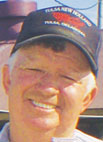
Couple provides high-quality lamb through multiple outlets
BENTONVILLE, ARK. – The Hanna Family Ranch, nestled in the scenic countryside amidst the bustling city of Bentonville, Ark., serves as a haven for owners Will and Waltina Hanna. With diverse backgrounds in agriculture, military service and human resources, the couple finds solace in their humble work as farmers.
Will Hanna, who served in the United States military in Vietnam and later continued his career of service as a firefighter, realized as he grew older that he wanted to spend the rest of his life raising animals, a passion he had developed during his childhood.
Will and Waltina Hanna are both from Bakersfield, Calif. They met each other in junior high school, and their lives together unfolded with each year they knew one another.
“We lived busy lives in California,” Will reflected, “It was very life-changing, serving in Vietnam, and I continued to realize how blessed I was to keep living my life. After all of those life stages began tying up neatly, I knew I wanted to pursue work that was as rewarding, and I found that in farming.”
At the forefront of the Hannas operation lies their lamb enterprise. After relocating to Northwest Arkansas from California, where they lived and worked for 30 years, the Hannas established their 35-acre family-owned ranch, which has since become a cornerstone of the local farm-to-table community. At any given time of year, the Hannas work with approximately 100 sheep, with around 200 sheep being raised annually.
“We had originally started out as hog farmers, but we were told by a friend that there was a huge opportunity in the lamb industry. Once we made the change, we never looked back.”
Now, their main focus is to produce high-quality lamb meat, which has proven to be a highly sought-after resource in the region. Beloved restaurants across Northwest Arkansas, including Conifer, Tusk and Trotter, Mirabella’s Table, Farmer’s Table, and more, contract the Hanna Ranch for their lamb. Additionally, they supply their meat to Ozark Natural Foods and the Arkansas Children’s Hospital among other businesses.
With continued years of business, their experience provided invaluable industry knowledge. As their involvement with local farm-to-tables increased, the Hannas began to understand what their deeper calling is- educating consumers on where their food comes from.
“Many people just don’t know the processes that put food on their tables. Some might not even have the curiosity since food is such a taken-for-granted necessity,” Waltina commented.
“We wanted to have a bigger part in the local food industry,” Will added, “We’re exceptionally blessed with the community in Arkansas and just how willing local businesses were to buy our produce.”
“We’re never bored.” Waltina said with a laugh. “We’re in our 70s, and there’s very little chance that we’re slowing down anytime soon. But I don’t think we’d have it any other way.”
While the Hannas operate a thriving, sustainable business that produces superior meat and crops, the center of their work, or, alternatively, the driving principle, is the education of their community and stakeholders on farming and agricultural practice.
“We want others to know, truly know how incredible farming can be. Anyone can farm. It’s modest work, but work that is very gratifying and something that provides for others around us. It has become more and more important to us to educate folks about farm life, how to do it or get started, and show where food comes from,” Waltina stated.

The Hanna Ranch has seen many visitors in the past several years to help achieve that goal. From buyers to schools, the Hannas warmly welcome any who are interested in coming observe their practice and learning in more detail about how they raise their lambs.
In recent years, the Hannas have noticed a wealth of the younger generation becoming more fascinated with the undertaking of producing farm-to-table food.
“It’s one of the reasons why we love working with businesses such as Ozark Natural Foods,” Will said. “There are always younger folks there asking questions about how to get their own crops set up. If even just to produce food for themselves, it’s really good to see more of the young generations be invested in their food.”
The growing interest from younger generations is encouraging. It reflects a broader awareness and appreciation for sustainable farming practices. By engaging with these young people and answering their questions, there’s hope that they will carry forward these values and practices into the future.
“The idea that produce doesn’t need to be perfect is something that’s catching on with younger people too,” Waltina added. “The things we do and the ideals we hold on the small scale, like what produce should look like or how lambs should be raised, is something we hope that trickles into the larger scale industry overtime. And that starts with you!”
This shift in perspective is part of a broader effort to educate and inspire future generations about the realities and values of farming.
“Overall, we want younger generations to understand how hard farmers work to produce the food that we all enjoy and how important the work is,” Will expressed. “If we can be a part of passing that knowledge down to future.”







